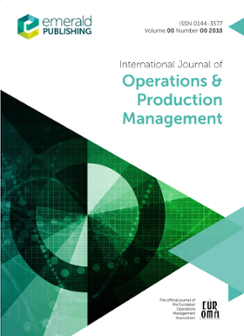How can suppliers increase their buyers’ CSR engagement: the role of internal and relational factors
IF 7.1
2区 管理学
Q1 MANAGEMENT
International Journal of Operations & Production Management
Pub Date : 2022-01-04
DOI:10.1108/ijopm-06-2021-0387
引用次数: 4
Abstract
PurposeBuyer engagement proves important supports for suppliers' corporate social responsibility (CSR); however, little is known about whether and how buyer CSR engagement can be actively searched for by a supplier and what activities and policies of suppliers could enhance buyer CSR engagement. From the perspective of resource dependence theory, this study aims to explore how suppliers seek to achieve buyers' CSR engagement.Design/methodology/approachThe proposed model and hypotheses were tested by structural equation modeling methodology using survey data collected from 243 manufacturing and service firms in China.FindingsThe results show that instrumental CSR motives and internalization of CSR policies jointly improve buyers' dependence, which in turn increases buyers' CSR engagement. In addition, this study investigates the influence of suppliers' trust on the effect of buyers' dependence on buyers' CSR engagement and finds a negative moderating effect on the dependence–engagement relation.Practical implicationsThe findings show that suppliers can actively engage in CSR to strengthen their position and improve the buyer CSR engagement. In fact, proactive CSR policies and implementation do pay off in the long run for them.Originality/valueThis study offers a fresh perspective on the role of suppliers in improving CSR. In contrast to much of the literature that has considered buyer-initiated practices and policies, this is the first theoretical and empirical investigation into how suppliers can increase the buyer CSR engagement.供应商如何提高买家的企业社会责任参与:内部因素和关系因素的作用
目的买方参与证明了对供应商企业社会责任(CSR)的重要支持;然而,对于供应商是否以及如何积极寻找买家的企业社会责任参与,以及供应商的哪些活动和政策可以增强买家的企业责任参与,人们知之甚少。从资源依赖理论的角度,本研究旨在探讨供应商如何寻求实现买方的企业社会责任参与。设计/方法论/方法利用从中国243家制造业和服务业企业收集的调查数据,采用结构方程建模方法对所提出的模型和假设进行了检验。此外,本研究还考察了供应商信任对买方依赖对买方企业社会责任参与的影响,并发现依赖-参与关系具有负调节作用。研究结果表明,供应商可以积极参与企业社会责任,以加强其地位,提高买方的企业社会责任参与度。事实上,从长远来看,积极的企业社会责任政策和实施确实会带来回报。原创性/价值本研究为供应商在改善企业社会责任方面的作用提供了一个新的视角。与许多考虑买方发起的实践和政策的文献相反,这是对供应商如何提高买方CSR参与度的首次理论和实证调查。
本文章由计算机程序翻译,如有差异,请以英文原文为准。
求助全文
约1分钟内获得全文
求助全文
来源期刊
CiteScore
13.30
自引率
17.20%
发文量
96
期刊介绍:
The mission of the International Journal of Operations & Production Management (IJOPM) is to publish cutting-edge, innovative research with the potential to significantly advance the field of Operations and Supply Chain Management, both in theory and practice. Drawing on experiences from manufacturing and service sectors, in both private and public contexts, the journal has earned widespread respect in this complex and increasingly vital area of business management.
Methodologically, IJOPM encompasses a broad spectrum of empirically-based inquiry using suitable research frameworks, as long as they offer generic insights of substantial value to operations and supply chain management. While the journal does not categorically exclude specific empirical methodologies, it does not accept purely mathematical modeling pieces. Regardless of the chosen mode of inquiry or methods employed, the key criteria are appropriateness of methodology, clarity in the study's execution, and rigor in the application of methods. It's important to note that any contribution should explicitly contribute to theory. The journal actively encourages the use of mixed methods where appropriate and valuable for generating research insights.

 求助内容:
求助内容: 应助结果提醒方式:
应助结果提醒方式:


